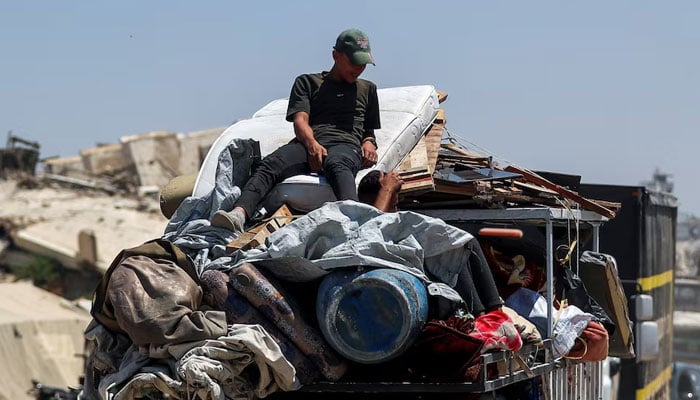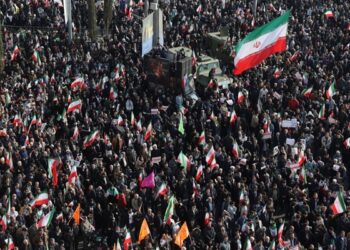Select Language:
Displaced Palestinians fleeing northern Gaza are seen traveling in a vehicle heading southward as the Israeli military prepares to relocate residents to the southern part of the enclave, in Gaza City on August 18, 2025 — Reuters.
– Israel plans a ground assault into Gaza’s largest city.
– Claims to provide shelter equipment for displaced Palestinians.
– Mediators in Cairo meet with Hamas in a renewed effort for a ceasefire.
—
Fearing an imminent Israeli-led ground invasion, thousands of Palestinians have evacuated their homes in eastern Gaza City, which is under relentless Israeli bombardment, moving toward the west and south within the fractured territory.
Israel’s intention to take control of Gaza City has sparked concern both internationally and domestically, with tens of thousands of Israelis participating in some of the largest protests since the conflict began. These demonstrations are calling for a diplomatic resolution to end the fighting and to secure the release of the remaining 50 hostages held by Hamas in Gaza since October 7, 2023.
In Gaza City, many residents are also organizing protests demanding an end to the war that has devastated much of the region and caused a humanitarian crisis. Calls are growing for Hamas to accelerate negotiations to prevent a ground invasion. An Israeli armored incursion could displace hundreds of thousands more, many of whom have already been uprooted multiple times during the ongoing conflict.
Ahmed Mheisen, a Palestinian shelter coordinator in Beit Lahiya—a suburb devastated by war adjoining eastern Gaza City—reported that 995 families have recently left the area heading south.
With the threat of an Israeli offensive imminent, Mheisen estimated that 1.5 million tents are needed for emergency shelter, noting that only 120,000 tents had entered Gaza during a ceasefire from January to March. The UN humanitarian office said last week that approximately 1.35 million people in Gaza are already in urgent need of shelter supplies.
“Tamar Burai, a Gaza City businessman, described the situation as akin to someone given a death sentence awaiting execution. ‘I am moving my parents and family to the south today or tomorrow. I cannot risk losing any of them in a sudden invasion,’ he said through a messaging app.
A union-led protest is planned for Thursday in Gaza City, with social media posts promising participation, raising pressure on Hamas. The last indirect ceasefire negotiations concluded in late July, ending in deadlock amid mutual accusations over the failure.
Sources involved in Cairo talks indicated that Egyptian and Qatari mediators met with Hamas and other factions, but little progress was made. Hamas reported to mediators that it was willing to resume discussions about a proposed 60-day ceasefire and releasing half of the hostages, but also wished for a broader deal to end the conflict altogether.
—
Diplomatic efforts have hit a deadlock. Israel insists it will cease hostilities only if all hostages are released and Hamas disarms—an demand publicly rejected by the group until a Palestinian state is established. A Hamas official confirmed to Reuters that the group refuses Israeli demands to disarm or remove its leadership from Gaza.
Major disagreements remain over the scope of an Israeli withdrawal from Gaza and how humanitarian aid will be distributed, as malnutrition and famine threaten civilians.
U.S. President Donald Trump expressed on social media that the return of hostages depends on confronting and destroying Hamas, asserting that the sooner this is done, the better the chances for success.
On Saturday, the Israeli military announced preparations to supply tents and shelter equipment for Gazans, aiming to relocate them from combat zones to the south. Details regarding quantities and timelines remain undisclosed.
The conflict started when Hamas crossed into southern Israel, killing 1,200 people and taking 251 hostages to Gaza, according to Israeli figures. Since then, more than 61,000 Palestinians have died in Israel’s air and ground assault, with local health officials reporting over 24 hours that five more Palestinians succumbed to starvation, raising the death toll from malnutrition to 263, including 112 children, since the war’s onset.







